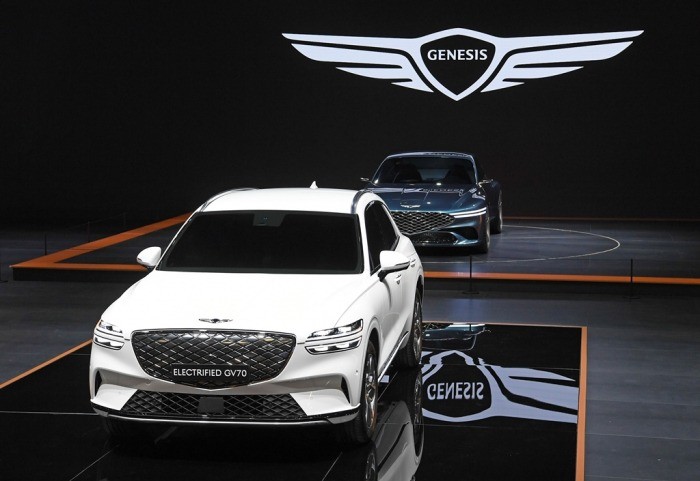Hyundai Motor Group is set to introduce hybrid models to its luxury Genesis brand, with the “Genesis Suv Hybrid” spearheading this strategic pivot. Industry sources revealed on Tuesday that this move comes as a response to a cooling electric vehicle (EV) market and aims to attract consumers who are still hesitant to fully embrace all-electric cars. Having initiated the development of hybrid powertrains for Genesis vehicles late last year, Hyundai is poised to launch its first Genesis hybrid variant as early as next year, potentially featuring a robust 2.5-liter engine. This engine size surpasses the 1.6-liter engine currently utilized in Kia’s Carnival hybrid, signaling Genesis’ commitment to performance even in its hybrid offerings.
Genesis GV70 Hybrid: Leading the Charge
The “genesis suv hybrid” is expected to be based on the popular GV70 SUV model, making it a highly anticipated addition to the Genesis lineup. Alongside the GV70, the G80 sedan is also likely to be among the first Genesis models to receive hybrid powertrains. This decision reflects Genesis’ understanding of market demands, particularly from US dealerships that have reportedly urged Hyundai to develop plug-in hybrid Genesis models. While the development of plug-in hybrids under the Genesis brand, which would incorporate battery technology similar to full EVs, remains under evaluation, the initial focus is clearly on standard hybrid technology.
Adapting to a Changing EV Landscape
This strategic shift marks an adjustment from Hyundai’s initial ambitious plan to transition all new Genesis vehicles launched from 2025 onwards to fully electric powertrains. The deceleration of the EV market in the latter half of last year prompted this revised approach. Global automotive giants like General Motors, Ford, Stellantis, and Volkswagen have also reacted to the changing market dynamics by scaling back investments and delaying EV development timelines. Genesis, recognizing this broader industry trend, is proactively adapting its strategy to maintain market competitiveness and cater to evolving consumer preferences.
Currently, Genesis offers three EV models: the electrified G80 and GV70, which are electric versions of their combustion engine counterparts, and the GV60, built on Hyundai’s dedicated EV platform, E-GMP. In the past year, Genesis experienced marginal overall sales growth, increasing from 215,128 units to 225,189 units. However, sales of its all-electric vehicles slightly declined, from 18,846 units to 18,759 units, further highlighting the need for diversified powertrain options.
Hyundai and Kia Expand Hybrid Offerings
Beyond Genesis, Hyundai and Kia are also expanding their hybrid vehicle portfolios. Flagship models such as the Hyundai Palisade SUV, the Santa Fe SUV, and the Staria minivan are slated to receive hybrid variants this year, all powered by either 2.5-liter or 1.6-liter engines. Kia is also set to introduce a hybrid version of the third-generation Seltos compact SUV next year, demonstrating a comprehensive hybrid strategy across the group’s brands.
The growing appeal of hybrid vehicles is evident in recent sales figures. Hybrids accounted for 10.6% of Hyundai’s global sales in the fourth quarter of last year, a significant increase from 7.1% in the same period the previous year. Conversely, the proportion of EVs in sales decreased from 5.7% to 5.3%. Kia reported an impressive 51% surge in US hybrid sales last month, while Hyundai’s plug-in hybrid sales also saw a robust 41% increase.
The Hybrid Advantage in a Shifting Market
Hybrid vehicles offer a compelling combination of improved fuel efficiency and reduced emissions compared to traditional combustion engine cars. For automakers, hybrids also present a financially attractive option with potentially higher profit margins, as they typically require less substantial incentives to drive sales compared to EVs. Toyota, a leader in hybrid technology, sold 3.4 million hybrid vehicles last year, marking a 31% year-over-year increase. Honda recently unveiled the new Civic hybrid, further indicating the growing momentum in the hybrid market.
Hyundai’s existing hybrid lineup includes popular models like the Sonata, Grandeur, Kona, Tucson, and Santa Fe. Kia offers hybrid versions of the K5, K8, Niro, Sportage, Sorento, and Carnival. As one automotive industry expert noted, “As the transition to electric vehicles is unexpectedly delayed, hybrid cars have taken the lead in the global car market.” The success of automakers in this evolving landscape will depend on their ability to swiftly introduce competitive hybrid models, with the “genesis suv hybrid” poised to be a crucial player for Hyundai in this strategic shift.
